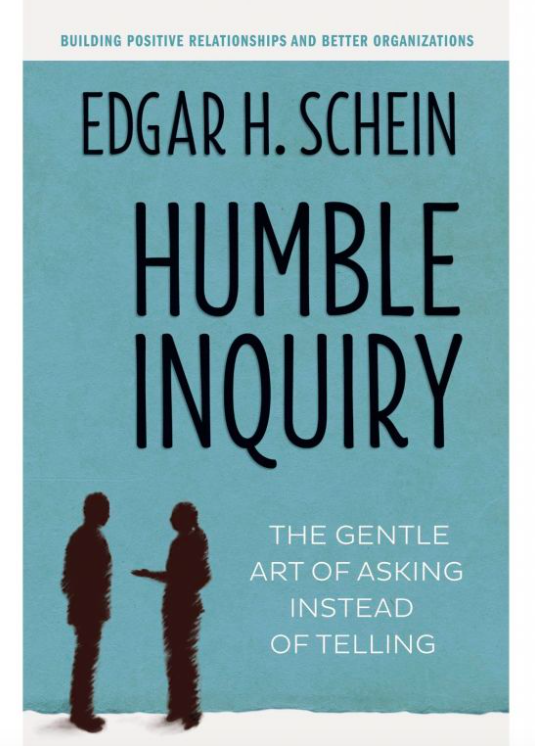“Humble Inquiry: The Gentle Art of Asking Instead of Telling”
Edgar Schein
110 pages
Available on Audible: 3 hours 30 minutes
The Wisdom in this book is best applied to the following within a dental office:
Patient Communication, Team Leadership
Edgar Schein is a retired professor from the MIT Sloan School of Management.
“Humble Inquiry” is a book that explores the advantages of approaching interactions with different individuals from a place of humility with a curiosity to discover more than you knew before the conversation. In my opinion, this book should become required reading at every dental school in the country and should be on most dentists shelf. Schein defines Humble Inquiry as:
“Humble Inquiry is the fine art of drawing someone out, of asking questions to which you do not already know the answer, of building a relationship based on curiosity and interest in the other person.”
If dentistry were an isolated endeavor, where we worked without a staff and worked on disembodied teeth, you would not need to read this book to improve your practice. Since most of us have a staff and work on teeth that have not been separated from our patients mouth the advice within its pages could propel you forward but only with practice and deliberate effort. Most of us like to tell, telling is efficient and robust. The problem with telling is that it does not foster relationships, neither with your patients or with your employees. Why do relationships matter? Relationships matter because our teams and our patients have choices in who they work with, and they are less likely to engage fully in their relationship with you if you do not humble yourself to them on some level.
Three Kinds of Humility:
- Basic Humility: Basic respect afford to other humans
- Optional Humility: Offered to those to whom we respect or have achieved a particular level of accomplishment or success
- Here-and-now Humility: Offered to those to whom you are dependent
Four Kinds of Inquiry
- Humble Inquiry: Genuine curiosity and interest in what the other person knows or thinks that might help me learn something.
- Diagnostic Inquiry: Exploring the others “feelings and reactions” and/or “causes and motives
- Confrontational Inquiry: When you insert your thoughts and biases into the questioning
- Process-oriented Inquiry: Reflecting on the person’s reactions to the questions
We live in a culture of do and tell which places the higher value on completing tasks than on growing and developing relationships. Valuing completion is particularly the case in dentistry where we are trained to and paid to get things done. This task completion focus has hurt more dentists than it has helped. In our culture dentists, doctors, business leaders are expected to do more telling than inquiring and listening. Just because it is a societal expectation does not mean it is an effective tactic to gain trust and emotional and intellectual buy-in with the person you hope to treat or lead. Trust is important. Schein states that: “trust in the context of a conversation is believing that the other person will acknowledge me, tell the truth, and, in the broader context, not cheat me, work on my behalf, and support the goals we have agreed to.” How often do you start treating your patients and leading your team before having acknowledged them or coming to an agreement about the goals of the relationship?
Schein points out that using “Humble Inquiry” is not without challenges. People are not always used to this level of inquiry, and it is possible that the dentist will stumble into a line of questioning that is guarded by the patient or employee, or that they do not know about themselves. The Johari Window invented by Joe Luft and Harry Ingham is a four-box diagram that describes how people have a concealed self, and unknown self, a blind self, and an open self. Going away from the open self may create challenges within the conversation, but they also present opportunities for deeper more meaningful relationships.
Developing the skill of “Humble Inquiry” definitely has great promise to improve the performance of your dental office and Schein provides some insight into how to do this in a general setting.
Slow down and vary the pace: Results matter more that completing the task. This skill seems like a variation of Dr. Barkley’s quote “Quality is the constant, time is the variable.”
Reflect more and ask yourself humble inquiry questions: Ask yourself what are you feeling, what is happening now, what do I want right now?
Review and Reflect on your behavior after an event: This is similar to number two but is conducted as a postmortem of a conversation.
An attitude of curiosity and interest in other people can and will contribute to greater success within your office. This achievement will start when you shift to more asking and less telling. Remember, telling people can be demeaning and harmful to developing a helping relationship. This book will offer greater insight into the concepts of “Humble Inquiry, ” but this synopsis should provide enough insight to make a positive change today. Scott Cairns
